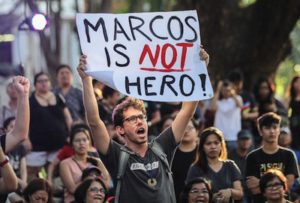A betrayal of the Philippines’ real heroes
November 22, 2016 · By Mary Aileen Bacalso for www.ucanindia.in
Bishops, rights groups condemn ‘shameful’ decision to bury former dictator Ferdinand Marcos in special cemetery.

By Mary Aileen Bacalso
Manila: The Philippine Supreme Court has spoken. There is no legal impediment to the burial of former dictator Ferdinand Marcos in the country’s cemetery for heroes.
This is a major insult to the dignity of thousands of victims of human rights violations during the darkest period of the Marcos regime. The decision squandered the hard-earned gains of the anti-Marcos struggle during the years of martial law.
President Rodrigo Duterte’s decision allowing the burial of Marcos in the heroes’ cemetery should be a cause of national shame in a county where shame is a lonely word.
Upon assumption of power, Duterte called for “unity and healing.” It was an opportunity for the Marcos family. Without acknowledging their sins against the people, the Marcoses are making a political comeback and found an ally in the new Philippine leader.
The court decision supporting Duterte is contrary to the very principles of justice to ferret out the truth, to punish perpetrators, and to take concrete measures to repair the damage done.
The court’s decision also causes “re-traumatization” to victims. Bereft of justice and reparation, they continue to suffer pain from the violations committed. Victims of the Marcos regime are “re-victimized” in this atmosphere of impunity.
At a conservative estimate, Amnesty International reported that some 70,000 people were imprisoned, 34.000 were tortured and 3,270 killed by the Marcos regime from the 1970s to the mid-1980s.
The Families of Victims of Involuntary Disappearances documented more than 800 cases of enforced disappearances.
When asked about her reaction to the court decision, Ron de Vera, son of a political detainee, said: “only through forgiveness based on justice can we truly move on.”
Ferdinand Marcos Jr., the son of the dictator, also spoke of healing and moving on.
But only those who have been wronged, hurt and victimized have the right to speak of reconciliation. The victims have no reason to forgive a remorseless sinner and his equally unrepentant family.
The Filipino people, who are the highest judges of the nation, had long spoken on this issue during the 1986 “people power” revolution that ousted Marcos.
“The issue of whether to allow the burial of Marcos in the [heroes’ cemetery] goes beyond what are inscribed in existing laws,” said Dr. Carolyn Sobritchea, a former dean of the Asian Center at the University of the Philippines.
She said the 1986 revolution “is a historical event that already defined the nation’s judgment on the kind of leader Marcos was.”
The court decision is a betrayal of the country’s real heroes who offered their lives so that the Filipino people can enjoy the freedom they have now.
A nation now divided needs the prophetic voice of Catholic Church leaders reminiscent of the pronouncements of the likes of the late Cardinal Jaime Sin of Manila.
Archbishop Socrates Villegas of Lingayen-Dagupan, president of the bishops’ conference, said he was “puzzled and hurt and in grief” at the court’s decision.
Our church leaders should do more as a good shepherd to the lost flock.
The remains of the late dictator will soon be laid in a place reserved for heroes. Marcos is no hero. He was a dictator, a killer and a plunderer. Even the National Historical Commission said that Marcos lied about his World War II medals. He is definitely unworthy of the honor only genuine heroes deserve.
As in 1986, the Filipino people should act as the highest judge and should exercise their sense of judgment. Giving Marcos a hero’s burial is the greatest shame in Philippine history.
Mary Aileen Bacalso is secretary-general of the Asian Federation Against Involuntary Disappearances. For her commitment to human rights, the government of Argentina awarded her the Emilio Mignone International Human Rights Prize in 2013.
Source: UCAN






